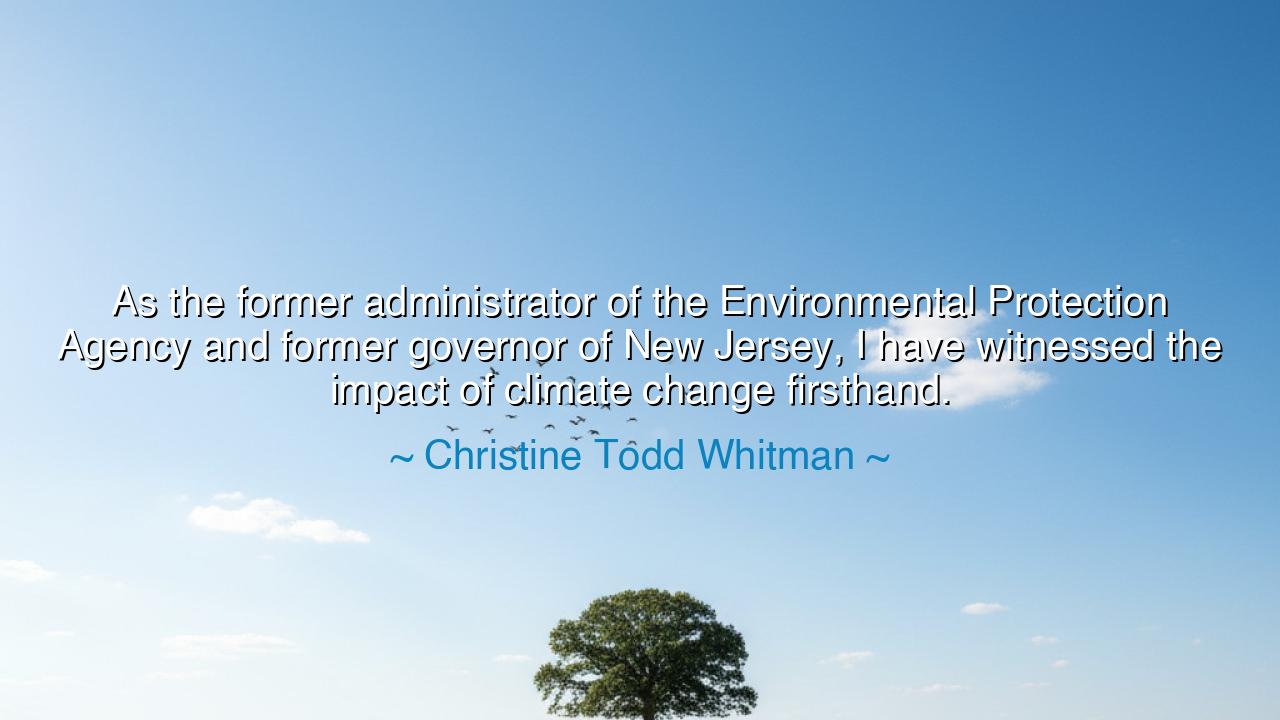
As the former administrator of the Environmental Protection
As the former administrator of the Environmental Protection Agency and former governor of New Jersey, I have witnessed the impact of climate change firsthand.






The words of Christine Todd Whitman, spoken with the authority of both governor and steward of the nation’s environment, echo with the clarity of lived experience: “As the former administrator of the Environmental Protection Agency and former governor of New Jersey, I have witnessed the impact of climate change firsthand.” In these lines, she does not speak from theory or distant observation, but from the vantage point of one who has governed, who has walked among storms and floods, who has seen the soil and sea bear witness to humanity’s neglect. Her testimony is not a debate of ideas but a declaration of reality.
At the heart of her words lies the weight of witnessing. To witness is not merely to see, but to carry the responsibility of truth. Whitman, having served as both leader of a state and guardian of the environment, affirms that the crisis of climate change is no abstraction—it manifests in rising tides along New Jersey’s coast, in battered infrastructure, in communities displaced by storms fiercer than memory recalls. Hers is a voice of one who cannot deny what her eyes have seen and her hands have touched.
History gives us many examples of leaders who bore such witness. In the time of the Great Dust Bowl of the 1930s, those who governed the plains could no longer ignore the ruined farms and families driven to migration. They saw firsthand the devastation wrought by both human mismanagement and nature’s wrath. From that suffering arose new policies of conservation, soil stewardship, and care for the land. So too does Whitman’s declaration echo that same truth: leadership that sees the damage firsthand cannot stand idle without betraying its sacred trust.
Her words also remind us that climate change is local as well as global. Too often we speak of melting ice caps and distant seas, forgetting that every state, every community, bears its own scars. In New Jersey, Whitman saw eroded shorelines, homes battered by storms, and public health threatened by poor air quality and rising temperatures. To name such impacts is to remind us that this crisis is not confined to future generations or faraway lands, but is unfolding here and now, before the eyes of those with the courage to see.
The power of Whitman’s statement also lies in its moral undertone. For when those who have held high office confess that they have witnessed the damage, the weight of denial collapses. A leader who has walked the halls of power and seen the evidence declares, in effect: you may argue politics, but you cannot argue reality. This is not ideology, but testimony; not speculation, but sight. Such words cut through the fog of debate and remind us that action delayed is action denied.
The lesson is profound: we must honor the witnesses of our age. When leaders, scientists, and citizens declare what they have seen with their own eyes, we must not dismiss their testimony. Instead, we must let it stir us to action. The floods, the fires, the storms, the sicknesses—they are all part of the evidence, each one a warning written by the hand of nature itself. To ignore them is to choose blindness; to heed them is to choose survival.
Therefore, children of tomorrow, take Whitman’s words as both warning and guide. See with your own eyes the changes around you—whether in the weather, the land, or the health of your community. Do not dismiss these as chance, but recognize them as part of the greater pattern of climate change. Act where you can: reduce waste, demand justice, support leaders who protect the earth. For the time of witnessing has already passed into the time of action. And remember: to witness is to be called, and to be called is to answer—not with silence, but with courage.






AAdministratorAdministrator
Welcome, honored guests. Please leave a comment, we will respond soon